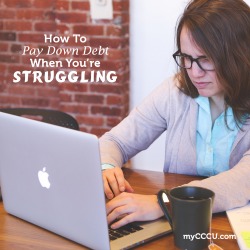
When you’re paying off medical bills, credit card bills, or any other debt, it can seem overwhelming. But the good news is that there is a way out of debt, and you can get there just by changing a few habits and attitudes about money. Here’s how to get started.
• Find out what you’re up against. Get a free copy of your credit report (and your spouse’s, if you’re married.) Check it carefully for any errors, and report any errors you find.
• Get organized. In order to tackle your debt, you’ll need to organize your finances. Write down all of your debts, including monthly payments and interest rates. Rank your debts by amounts due. Write down all of your other monthly bills. Then write down any and all sources of income you have. (You can use a spreadsheet for this, an app like Money Management, or just regular pen and paper.)
• Make a budget. Now that you know how much you have coming in per month, write down your incoming and outgoing money. If there’s not much gap between your spending and your income, you may need to make some adjustments to your spending or find ways to generate extra income.
Once you’ve got those basics taken care of, you can address your debt problem. With your budget in hand, you’ll know how much you have left at the end of each month. Now you can start making that cash work for you.
• Don’t just pay the minimum. If at all possible, pay more than the minimum amount on your bills. Making a minimum payment may help you feel like you’re on top of your debts, but paying only that much lets interest pile up on your account.
• Snowball your debt away. Look at your list of debts. Put any and all available extra cash towards the bill with the lowest balance. Once you’ve paid that smallest balance off, put the money you were paying on that bill each month (plus your available extra cash) towards the bill with the next smallest balance. Like a snowball rolling down a hill, you’re creating momentum that will help you wipe out your debt faster.
• Use bonuses wisely. Did you get a bonus from work? A tax refund? Birthday money from Grandma? Put it towards your current lowest-balance debt so you can keep your snowball moving.
• Lower your interest rate. Sometimes, especially if you’ve been a cardholder for a while, you can renegotiate your interest rate on credit cards. It doesn’t hurt to try.
Also, if you have a lot of high-interest card debt, you might want to look into getting a balance transfer or a personal loan that can help you consolidate that debt with a lower interest rate.
• Don’t close accounts. If you’ve paid off an account, great! But don’t close it. Closing accounts, especially long-held ones, can hurt your credit score. Instead, keep the account active by making a small purchase every few months, then paying it off immediately in full.
• Negotiate your medical bills. Medical bills can be confusing, and even with health insurance, you can be left paying big out-of-pocket costs. Many times, you can negotiate down these extra costs with your provider. If you have a very complex case, a medical billing advocate may be able to help.
Paying down debt can be tough, but don’t get discouraged. You didn’t get into this debt overnight, and you won’t get out of it overnight. Stay positive and keep rolling your snowball until you’re debt free! And if you need more personal finance coaching, our partners at GreenPath Financial Wellness can help.
This article should not be considered legal, tax, or financial advice. You may wish to consult a tax or financial advisor about your individual financial situation.
This article was edited 12/29/16 for accuracy of links.



